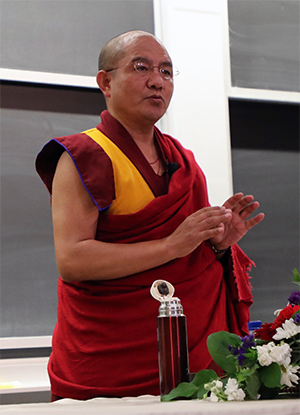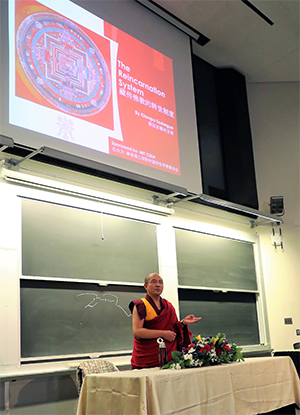The Reincarnation System
In his lecture on reincarnation, Khenpo talks about the meaning of tulku, mentioning that in a broad sense it can be understood as the four emanating forms of the Buddha. He also mentions the typical tulku system from the period of Karmapa III in Tibet, and the phenomenon of today’s tulku, the so-called “Living Buddha”. Khenpo encouraged students and faculty alike to strengthen their minds and never stop learning. He also invited them to explore the possibility of reincarnation and to adjust their minds in order to acquire real happiness.
How to Face Uncertainty?
How to Face Uncertainty?
In our pragmatic society, it is, perhaps, not realistic to have many people study art and religion. Perhaps the best strategy in this case is to adjust one’s mindset. We face unseen, uncertain pressures in our lives and what happens the next minute, the next hour is beyond our vision and control. Since all kinds of incidents are taking place in our midst or will take place, it’s important for us in facing them to put into practice what we’ve learned. Or, as the MIT motto says, “mind and hand”.
An Issue Worthy of Reconsideration
Everyone should think about it: did I come here from my previous life? Will I reincarnate in the afterlife? We are sitting here today as human beings. But why didn’t we become animals? There are so many animals on the earth and in the oceans, why didn’t we become one of them? Again, some people are rich, others are poor, some are wise, others are not. Why is that? Is it really because of genetics or an accidental cause as Evolutionism believes? No matter what your faith is, I think this is a worthy issue deserving of our attention.
Faith is Important in All Eras
During the Industrial Revolution, many manual laborers were replaced by machines. In the same way, there is a real possibility today of AI replacing much of our workforce, including the white collar sector. I’ve watched some film clips predicting that many architectural projects and designs will be mechanized in the future. These sweeping replacements will also affect other professions, such as doctors, lawyers and law enforcement. If this happens many people without work will become idle. At such time, we must affirm the deep faith in our hearts, true faith that comes from the realization of mind, as taught in eastern cultures.
The Way to Face Afflictions in Life
It’s my belief that we cannot be passive in our lives; we cannot give up and surrender. Instead, we must strive to do our best. If along the way, we encounter obstacles or sometimes fail, we must continue striving. Then the obstacles in our path will prove both beneficial and valuable: life, after all, is a winding, rocky road, not always safe and sound. Where the road curves we learn to adjust our mind view. Whoever you are, it is really important to monitor and observe your state of mind.
Turn Obsessions into Enjoyment
All of us are obsessed at different times in our lives with things that we later find funny or ridiculous. As children, we are drawn to our toys and cry if you lose them. As young people, we fall in love then suffer through a breakup. Once we reach middle age, we are busy pursuing wealth and status. In our twilight years, we worry about our health. These obsessions occur in different periods throughout our life. If we can manage our obsessions in each period and adjust our mind, it will lead to enjoyment.

How to Face Uncertainty?
We face unseen, uncertain pressures in our lives and what happens the next minute, the next hour is beyond our vision and control. Since all kinds of incidents are taking place in our midst or will take place, it’s important for us in facing them to put into practice what we’ve learned. Or, as the MIT motto says, “mind and hand”.

An Issue Worthy of Reconsideration
Everyone should think about it: did I come here from my previous life? Will I reincarnate in the afterlife? We are sitting here today as human beings. But why didn’t we become animals? Is it really because of genetics or an accidental cause as Evolutionism believes? No matter what your faith is, I think this is a worthy issue deserving of our attention.
“In Tibetan Buddhism, a tulku is not necessarily a Buddha or an enlightened person. A tulku is someone, who, through long-term practice, reaches the highest state achievable in this life and who continues his spiritual practice in the next life.”
